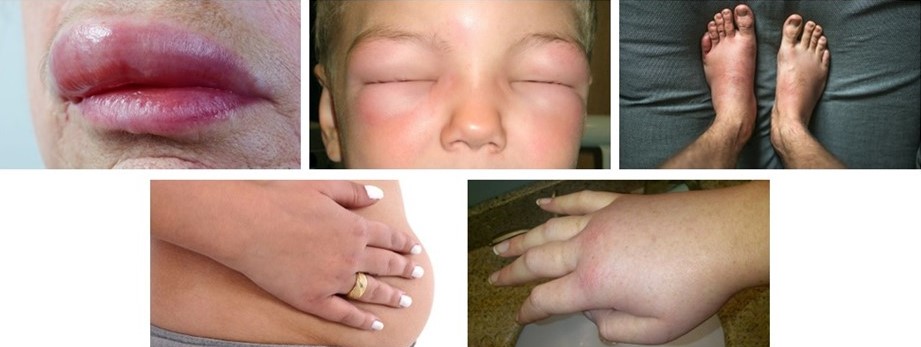Hereditary angioedema (HAE) is a rare genetic disorder often misdiagnosed with another disease in Vietnam, leading to improper treatment, non-remission, and possibly worsening.
Therefore, building the capability for HAE diagnosis and treatment is essential.
35 years of suffering from rare condition
Over the past 35 years, Truong Q. L., a 58-year-old in District 7, Ho Chi Minh City, has suffered from a strange disease when swellings all over the body have no known cause.
"Sometimes I get swelling, sometimes on my arms and legs, sometimes on my abdomen, face, neck, and back,” L. said.
“Then there are episodes of pain in the upper abdomen.
“At first, I thought I had allergies or stomach disease, but even though I went to many places for treatment and took many medicines, I could not cure the disease.”
During an allergy examination at University Medical Center under the University of Medicine and Pharmacy at Ho Chi Minh City, Tran Thien Tai, M.D., MSc., head of the Allergy-Clinical Immunology Unit, suspected L. to have HAE so the doctor assigned the patient to participate in the free HAE screening test program implemented by the Ho Chi Minh City Society of Asthma, Allergy, and Clinical Immunology.
The result showed that L. is affected by HAE. According to the narrative, L. suspected that his recently deceased father suffered from the same condition, but more severely, and he had to live with it for the rest of his life.
Dr. Tai said L. is one of seven cases of HAE detected by the unit since July 2022.
"The patients came to us after having been treated in many places, but their condition was not in remission,” the doctor said.
“Moreover, this is a genetic disease. Specifically, three people in a family all have this disease, including a 72-year-old and a five-year-old."
HAE is a dominant genetic disease characterized by swelling of the skin and subcutaneous tissue that results in local episodes of edema in different parts such as the abdomen, face, feet, genitals, hands, throat, and internal organs (intestines), causing abdominal pain, nausea, and vomiting, according to Dr. Tai.
It is a rare disease with an estimated incidence of 1 in 50,000 people.
In some countries, such as Japan, about 2,000-3,000 people have the disease, but only around 450 patients are diagnosed and treated.
In Vietnam, an estimated 2,000 people suffer HAE but the number of patients diagnosed has not been recorded.
|
|
| Hereditary angioedema is a rare disease and can lead to death when not treated promptly. |
In northern Vietnam, Hanoi-based E Hospital has diagnosed five people with HAE.
Bui Van Dan, M.D., Ph.D., in charge of the Department of Allergy, Immunology, and Dermatology at the hospital, said that patients mainly have edema of the lips, eyes, limbs, and genitals.
However, other common symptoms include abdominal pain (due to intestinal loop edema) or shortness of breath (due to airway edema).
Such symptoms usually appear suddenly or after triggers and last 3-5 days.
Elaborating on this rare disorder, Assoc. Prof. Hoang Thi Lam, MD., Ph.D., of the Allergy-Clinical Immunology Unit at the University Medical Center in Ho Chi Minh City, said that edema symptoms usually appear independently and regress without scarring or sequelae.
However, gastrointestinal symptoms can be severe and easily misdiagnosed with emergency abdominal pain such as appendicitis, and the patient may be subjected to unnecessary surgery.
In particular, HAE can be life-threatening when it occurs in the larynx.
Then the edematous laryngeal tissue compresses the airway, causing shortness of breath and rapid asphyxiation.
"Studies show that more than half of HAE patients have laryngeal edema, so they need to be diagnosed to avoid life-threatening episodes of laryngeal edema," Dr. Lam warned.
Difficulties in diagnosis, treatment
Dr. Lam said that HAE patients have diverse, less specific, and rare edema, so it is often easy to be misdiagnosed with many other skin diseases, especially allergies and urticaria.
HAE also has a different pathogenesis than allergies, so allergy medications are less effective against the disease, costing patients money and effort.
Most people with HAE have to see 5-6 specialists and it takes an average of 13-16 years from the onset of symptoms to be identified.
As a result, patients are diagnosed late, leading to complex treatment and reduced quality of life.
Public awareness of the disorder needs to be improved, even among healthcare professionals.
According to Dr. Dan, hereditary angioedema has yet to be included in universities' medical doctor training programs, so it is common to misdiagnose in grassroots and non-specialized hospitals.
Besides, the C1 inhibitor test, the gold standard in diagnosing hereditary angioedema, has yet to be implemented domestically; the samples must be sent abroad, so the diagnostic cost is prohibitive.
In addition, there is no specific treatment, especially when patients have life-threatening acute episodes, which is also a problem in Vietnam today.
Understanding the difficulties in diagnosing and treating HAE in Vietnam, in 2021, Takeda Pharmaceutical Company Limited, in collaboration with the Japan National Center for Global Health and Health (NCGM) and the Ho Chi Minh City Society of Asthma, Allergy, and Clinical Immunology, implemented the ‘NCGM HAE Rare Disease Capacity Project,’ in which they organized numerous training programs, workshops, and developed the guideline for diagnosis and treatment of HAE for healthcare professionals in hospitals across the country.
Up to now, there have been more than 1,800 healthcare professionals partaking in workshops, training, and doctor clubs in Vietnam and Japan.
In addition, Takeda also cooperated with the Ho Chi Minh City Society of Asthma, Allergy, and Clinical Immunology to implement the free HAE screening test program for 100 patients and their relatives.
As a result, after more than ten months of implementation, 15 patients have been diagnosed. Three pediatric patients were diagnosed early from five to six.
All these achievements are a proud outcome of the parties supporting the program for a rare disease like HAE.




















































